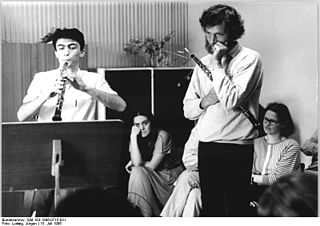Related Research Articles
Friedrich Goldmann was a German composer and conductor.

Günter Kochan was a German composer. He studied with Boris Blacher and was a master student for composition with Hanns Eisler. From 1967 until his retirement in 1991, he worked as professor for musical composition at the Hochschule für Musik "Hanns Eisler". He taught master classes in composition at the Academy of Music and the Academy of Arts, Berlin. He was also secretary of the Music Section of the Academy of Arts from 1972 to 1974 and vice-president of the Association of Composers and Musicologists of the GDR from 1977 to 1982. Kochan is one of eleven laureates to have been awarded the National Prize of the GDR four times. In addition, he received composition prizes in the US and Eastern Europe. He became internationally known in particular for his Symphonies as well as the cantata Die Asche von Birkenau (1965) and his Music for Orchestra No. 2 (1987). His versatile oeuvre included orchestral works, chamber music, choral works, mass songs and film music and is situated between socialist realism and avant-garde.
Gruppe Neue Musik Hanns Eisler was an ensemble of musicians founded in 1970 in Leipzig with a focus on contemporary classical music, which played several world premieres and toured internationally. The ensemble disbanded in 1993.

Burkhard Glaetzner is a German oboe virtuoso und conductor. He is one of the leading oboe players in Germany.
Wolfgang Weber is a German cellist.
Gerd Schenker is a German percussionist.
The Leipziger Consort was a well-known chamber music ensemble from the DDR
Gerhard Erber was a German classical pianist and academic teacher. He played as a member of the East German ensemble Gruppe Neue Musik Hanns Eisler, which focused on contemporary chamber music. He was a professor of piano at the University of Music and Theatre Leipzig, and organised a Bach competition in Köthen.
Karl Ottomar Treibmann was a German composer and music educator. From 1981 until his retirement in 2001, he was professor of music theory and Tonsatz at the Leipzig University. He was one of the representatives of modernity in the German Democratic Republic, whose great major works can be found in the areas of opera, symphony and chamber music.
Gunter Sieberth is a German oboist.

Friedrich Schenker was a German avant-garde composer and trombone player.
Dieter Zahn is a German double bassist.
Matthias Sannemüller is a German violist.
Hans-Christian Bartel was a German violist and composer.
Walter Thomas Heyn is a German guitarist, composer and music producer.
Günter Neubert is a German composer and tonmeister.
Jürgen Elsner is a German music ethnologist and author.
Hans-Peter Jannoch (1938–2004) was a German conductor, composer and pianist.
Reinhard Wolschina is a German composer.
Hanning Schröder was a German composer and violist. From 1927, he worked in Berlin as a violist in orchestras for opera, radio and film, and in the Havemann String Quartet of his teacher Gustav Havemann. He formed the Harlan Trio with his wife and violinist Peter Harlan, performing Renaissance and Baroque music as pioneers of historical instruments. Due to his wife's Jewish descent, he had to stop working under the Nazi regime from 1935. They hid a Jewish couple in the house in Berlin that they left for safety reasons, earning them a Righteous Among the Nations recognition. As a composer, Schröder is known for chamber music, especially a string quartet based on the song of the Moorsoldaten from the Börgermoor concentration camp.
References
- ↑ Vereint Tradition und Moderne. Axel Schmidt, Oboe. on WorldCat